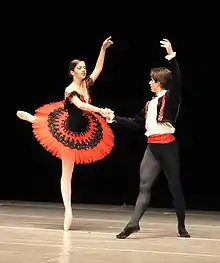ballet
English

Etymology
Borrowed from French ballet, from Italian balletto (“short dance, ballet”), diminutive form of ballo (“ball”).
Pronunciation
- (Received Pronunciation) IPA(key): /ˈbæleɪ/, /bælɪ/
- (General American) enPR: bă-lāʹ, băʹlā(') IPA(key): /bæˈleɪ/, /ˈbæ(ˌ)leɪ/
Audio (US) (file) - Rhymes: -æleɪ, -æli, -eɪ
- Hyphenation: bal‧let
Noun
ballet (countable and uncountable, plural ballets)
- A classical form of dance.
- A theatrical presentation of such dancing, usually with music, sometimes in the form of a story.
- The company of persons who perform this dance.
- (music) A light part song, frequently with a fa-la-la chorus, common among Elizabethan and Italian Renaissance composers.
- (heraldry) A bearing in coats of arms representing one or more balls, called bezants, plates, etc., according to colour.
Part or all of this entry has been imported from the 1913 edition of Webster’s Dictionary, which is now free of copyright and hence in the public domain. The imported definitions may be significantly out of date, and any more recent senses may be completely missing.
(See the entry for ballet in Webster’s Revised Unabridged Dictionary, G. & C. Merriam, 1913.)
Derived terms
Translations
|
|
- The translations below need to be checked and inserted above into the appropriate translation tables, removing any numbers. Numbers do not necessarily match those in definitions. See instructions at Wiktionary:Entry layout#Translations.
Verb
ballet (third-person singular simple present ballets, present participle balleting, simple past and past participle balleted)
- To perform an action reminiscent of ballet dancing.
- 2014 Rutherford's Vascular Surgery E-Book - Page 1340
- Situations that typically require longer iliac limbs than the measurements suggest include extreme iliac tortuosity, “balleting” of the limbs (Endurant and Excluder) (Fig. 90-3), and the need to extend to the external iliac arteries. It these anatomic circumstances, it is prudent to choose a longer length when in doubt.
- 2016 Jacob Russell Dring, "Endless the Chase"
- Unfortunately, he could only sustain so much abuse. Footfalls approached. Kanoa's lips smacked and his jaw hung open. His eyelids fluttered, their underlying gaze balleting without clarity. He felt beyond sick, and his world spun immensely. A garbled voice of incoherency seemed to be his only link to this realm of consciousness.
- 2017 Num Nums "A Total Bust a Move" The ZhuZhus
- Frankie's obviously going to ballet her way to the trophy.
- 2014 Rutherford's Vascular Surgery E-Book - Page 1340
See also
Chavacano
Danish
Etymology
Either from French ballet or directly from Italian balletto, the diminutive form of ballo (“dance, ball”).
Pronunciation
- IPA(key): /balɛt/, [b̥aˈlɛd̥]
Inflection
| common gender |
Singular | Plural | ||
|---|---|---|---|---|
| indefinite | definite | indefinite | definite | |
| nominative | ballet | balletten | balletter | balletterne |
| genitive | ballets | ballettens | balletters | balletternes |
French
Pronunciation
- IPA(key): /ba.lɛ/
Audio (file)
Further reading
- “ballet” in le Trésor de la langue française informatisé (The Digitized Treasury of the French Language).
German
Northern Sami
Pronunciation
- (Kautokeino) IPA(key): /ˈpalleh(t)/
Verb
ballet
- inflection of ballat:
- third-person plural present indicative
- second-person singular past indicative
- second-person plural imperative